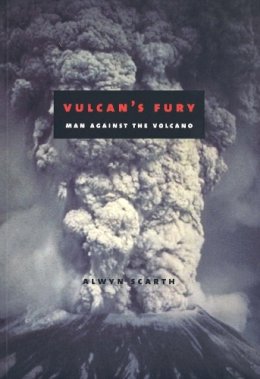
Stock image for illustration purposes only - book cover, edition or condition may vary.
Description for Vulcan's Fury
Paperback.
Volcanic eruptions are the most spectacular displays in the natural world. They also present humanity with devastating environmental disasters. This enthralling book describes fifteen of the most remarkable volcanic eruptions across the centuries and, using rare firsthand accounts, analyzes their impact on the people in their paths.
In 79 a.d. Vesuvius produced the most violent eruption recorded in European history. The eruption of Etna in 1669 marked the first known attempt to divert a lava-flow. In 1783, the eruption of Laki indirectly killed a fifth of the Icelandic population and sent a blue haze over Europe. The eruption of Krakatau in 1883 drowned most of its victims and destroyed much of the island as well. In 1980 Mount St. Helens produced a new type of eruption and scythed down a majestic forest. Alwyn Scarth explores these and other eruptions, reconstructing the physical experience of the disaster, its origins, explosion, and aftermath, and interpreting (in many cases for the first time in English) eyewitness accounts that bring their own vividness to the unfolding drama. The accounts tell of fear, panic, miscalculation, and inefficiency as well as emergency organization, self-sacrifice, religious fervor, and heroism, revealing how each affected population handled—or mishandled—its crisis. Scarth’s riveting survey shows that technology and volcanic surveillance have made enormous strides during the present century. But volcanoes remain indomitable: no one has yet learned how an eruption can be stopped.
In 79 a.d. Vesuvius produced the most violent eruption recorded in European history. The eruption of Etna in 1669 marked the first known attempt to divert a lava-flow. In 1783, the eruption of Laki indirectly killed a fifth of the Icelandic population and sent a blue haze over Europe. The eruption of Krakatau in 1883 drowned most of its victims and destroyed much of the island as well. In 1980 Mount St. Helens produced a new type of eruption and scythed down a majestic forest. Alwyn Scarth explores these and other eruptions, reconstructing the physical experience of the disaster, its origins, explosion, and aftermath, and interpreting (in many cases for the first time in English) eyewitness accounts that bring their own vividness to the unfolding drama. The accounts tell of fear, panic, miscalculation, and inefficiency as well as emergency organization, self-sacrifice, religious fervor, and heroism, revealing how each affected population handled—or mishandled—its crisis. Scarth’s riveting survey shows that technology and volcanic surveillance have made enormous strides during the present century. But volcanoes remain indomitable: no one has yet learned how an eruption can be stopped.
Product Details
Format
Paperback
Publication date
2001
Publisher
Yale University Press United States
Number of pages
320
Condition
New
Number of Pages
312
Place of Publication
, United States
ISBN
9780300091236
SKU
V9780300091236
Shipping Time
Usually ships in 7 to 11 working days
Ref
99-50
About Alwyn Scarth
Alwyn Scarth was lecturer in geography at the University of Dundee. His most recent book is Savage Earth.
Reviews for Vulcan's Fury
"Scarth's readers will learn what authorities now know about how to predict and prepare for big eruptions, and the riveting accounts he provides of each calamity, eye-witness and secondhand, display the fascination that leads so many scientists to risk their lives to study volcanoes." Publishers Weekly "Informative, fascinating, and sobering for the professional volcanologist, anyone attracted by volcanoes and, indeed, anyone interested in human resourcefulness." Hazel Rymer, Times Higher Education Supplement "Gripping and richly illustrated." Robert Kunzig, Discover "Scarth... has assembled riveting eyewitness accounts from lucky survivors through the ages." Laurence A. Marschall, The Sciences "I found the accounts of each of these contrasting events compelling and highly informative, from both geological and sociological perspectives... Scarth is to be congratulated on an excellent book that is easy to read, difficult to put down, and deserving of a very wide audience." Peter Cattermole, Interdisciplinary Science Reviews
